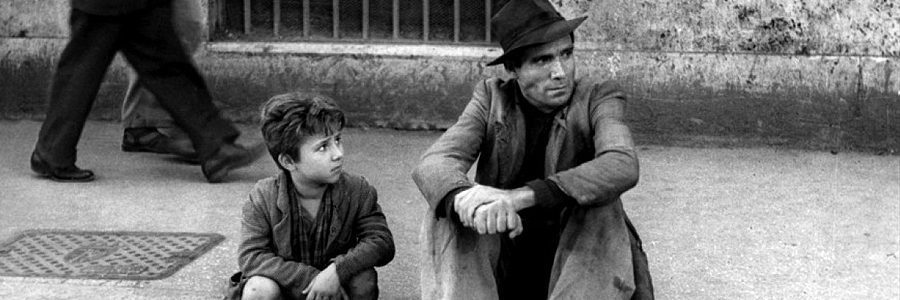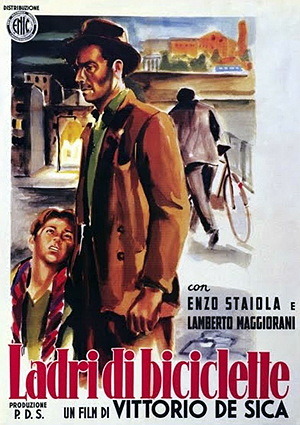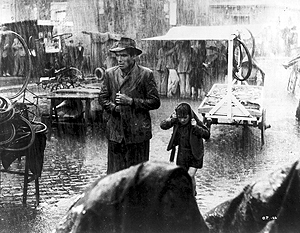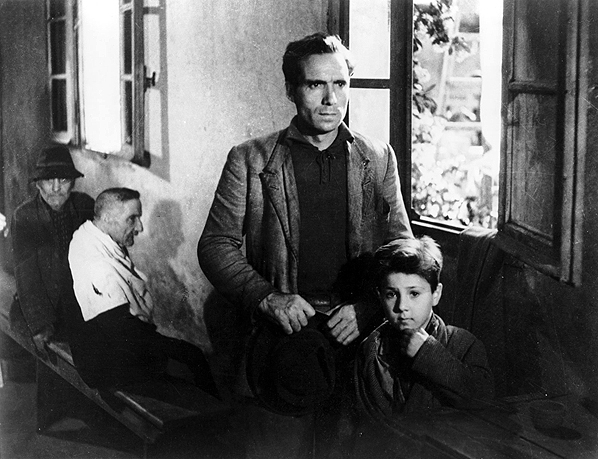
Bicycle Thieves

THE BICYCLE THIEVES (MOVIE)
Ente Nazionale Industrie Cinematografiche
Original release: November 24th, 1948
Running time: 93 minutes
Director: Vittorio De Sica
Writers: Vittorio De Sica, Cesare Zavattini, Luigi Bartolini
Cast: Lamberto Maggiorani, Enzo Staiola, Lianella Carell

Desperate people do desperate things. Whether it’s making rent or worrying if you’ll have a job next month this time, the fear remains the same and somehow we keep moving forward so as to never stop long enough to make it a reality. I can imagine that fear’s multiplied though when you have a family to look after. What happens then when the very thing you depend on to help your provide for them is taken away?
In Vittorio De Sica’s neorealist classic, based on Luigi Bartolini’s novel and adapted for the screen by Cesare Zavattini, this is exactly what we see happening to the film’s protagonist, but to say Bicycle Thieves is one of the greatest films ever made is really to undersell it. As we watch the story unfolding our hearts truly go out to him as he becomes more and more desperate.
Bicycle Thieves tells the story of family man Antonio Ricci (Lamberto Maggiorani) who, after a long spell of unemployment, lands a job putting up film posters on billboards. The job requires that he must have a bicycle, but as he’s recently pawned it so his family can eat, he’s worried he might not be able to take the job. Antonio’s wife, Maria (Lianella Carell), decides to sell the family’s linen so they can get the bicycle back, but on his first day of work the unthinkable happens – it’s stolen.
Desperate to find it before it’s taken apart and sold at the local market, Antonio takes his friends and his young son Bruno (Enzo Staiola) to help him look for it. For hours Antonio and Bruno search, even in the pouring rain, until the little boy’s too tired and hungry to go any further. After trying everything he can think of to get his bicycle back, eventually, out of frustration, Antonio will make one last attempt to try and get it back.

Though the actors were not professional, their performances are exceptional throughout Bicycle Thieves. Lamberto Maggiorani’s expressions are those of a man who loves and cares for his family deeply, but he’s also a decent man; humble, honest and sensible. His scenes with Enzo Staiola, who was seven years old at the time, are extraordinary. Chosen for the part specifically because of his walk, Enzo’s presence in the movie verges on magical. Our hearts ache when we see him drenched in a downpour and race when we believe he’s drowned.
It’s as much a father-son story as it is a comment on post-War Italy, told using the labyrinthine Italian towns as a backdrop with De Sica’s strong visual style and his refusal to use a studio setting, opting instead for as much real life as he can capture. It’s simple, humanistic approach allows for the story to stay with us long after the final frame has faded.
- [1] Lucia Nagib, Theorizing World Cinema (2011), I.B.Tauris
While focusing on their real world existence and the daily problems a struggling family like Antonio’s faces, De Sica explores this neorealist backdrop in a way that few films have come close to doing, making it the ultimate expressionist of the art form in the same way we can consider films like Das Cabinet des Dr. Caligari (1920), Nosferatu, eine Symphonie des Grauens (1922) and Metropolis (1927) to be ultimate expressions of expressionism.
The film’s strength lies in the fact that we’re easily able to relate to its characters and to be swept up in the scenery that brings it all to life. I’ve no problems with saying Bicycle Thieves is an outstanding film that should be seen by anyone who calls themselves a fan of cinema at its highest quality or of storytelling at its most beautiful with its effortless simplicity.


Patrick Samuel
The founder of Static Mass Emporium and one of its Editors in Chief is an emerging artist with a philosophy degree, working primarily with pastels and graphite pencils, but he also enjoys experimenting with water colours, acrylics, glass and oil paints.
Being on the autistic spectrum with Asperger’s Syndrome, he is stimulated by bold, contrasting colours, intricate details, multiple textures, and varying shades of light and dark. Patrick's work extends to sound and video, and when not drawing or painting, he can be found working on projects he shares online with his followers.
Patrick returned to drawing and painting after a prolonged break in December 2016 as part of his daily art therapy, and is now making the transition to being a full-time artist. As a spokesperson for autism awareness, he also gives talks and presentations on the benefits of creative therapy.
Static Mass is where he lives his passion for film and writing about it. A fan of film classics, documentaries and science fiction, Patrick prefers films with an impeccable way of storytelling that reflect on the human condition.
© 2022 STATIC MASS EMPORIUM . All Rights Reserved. Powered by METATEMPUS | creative.timeless.personal. | DISCLAIMER, TERMS & CONDITIONS
HOME | ABOUT | CONTACT | TWITTER | GOOGLE+ | FACEBOOK | TUMBLR | YOUTUBE | RSS FEED
CINEMA REVIEWS | BLU-RAY & DVD | THE EMPORIUM | DOCUMENTARIES | WORLD CINEMA | CULT MOVIES | INDIAN CINEMA | EARLY CINEMA
MOVIE CLASSICS | DECONSTRUCTING CINEMA | SOUNDTRACKS | INTERVIEWS | THE DIRECTOR’S CHAIR | JAPANESE CINEMA





